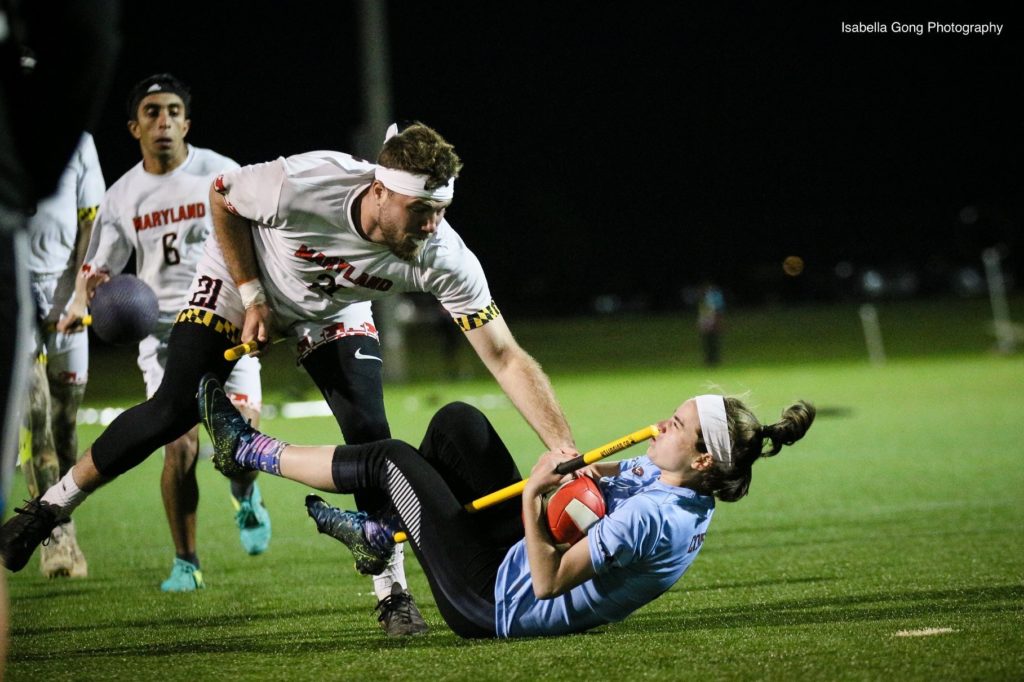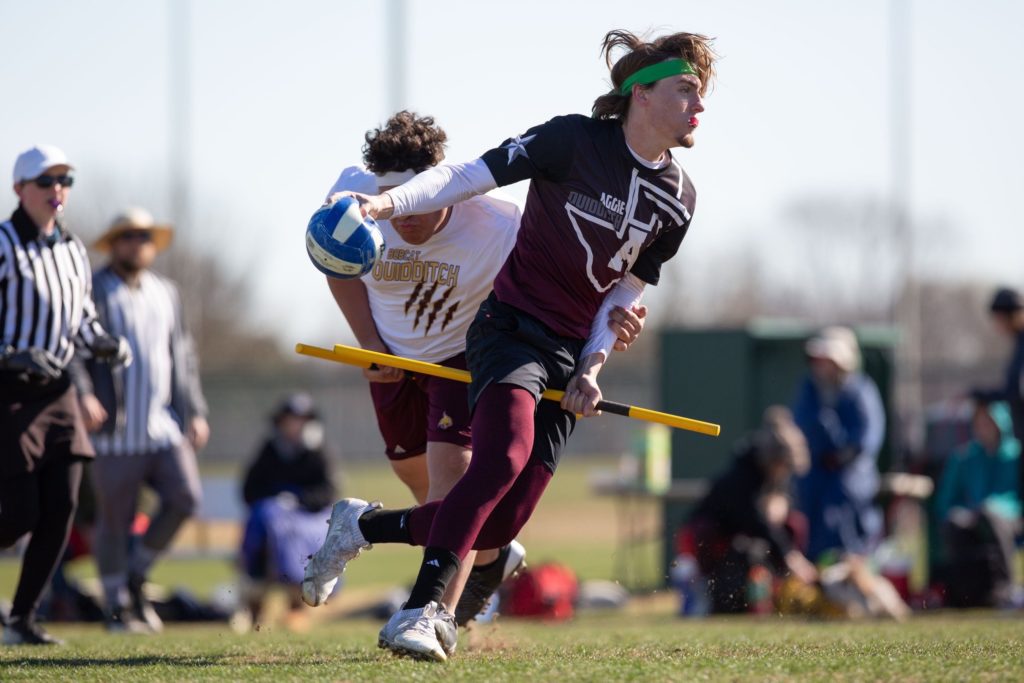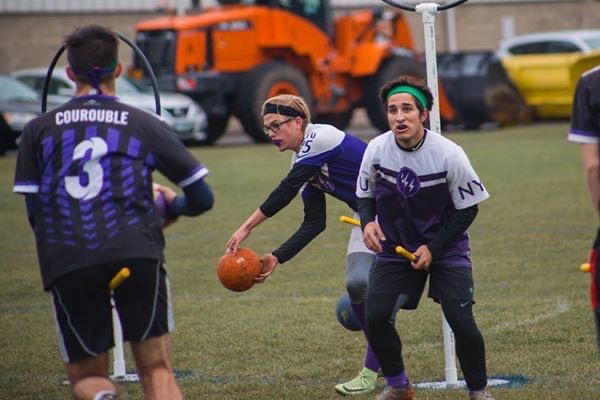Antwerp QC, Much of Belgian Core, Leaves Competitive Quidditch

Credit: Isabella Gong
UPDATE: University of Rochester completed the registration process around 11:40 pm ET on Wednesday, Oct. 2 and are actively trying to fulfill gameplay requirements for regionals. They were unofficial as of time of press.
Correction: In the original copy, we incorrectly stated “a club team that went 1-3 in their pool at USQ Cup 12 last year just tied to win Turtle Cup.” The correct statistic is 1-4.
While it may be difficult to believe if you live in certain parts of the country, we are already three weekends into the 2019-20 USQ season. At The Eighth Man, we have already put out rankings, and some of those ranked teams have already lost, leaving egg all over our faces. In under four weeks, USQ will award the first regional title of the year. It’s really your typical September in quidditch.
Of course, the new season marked some major, fundamental changes to USQ, specifically in the club decision. The details of the changes could fill another whole article, but in summary: Club teams no longer have to attend regionals; there will be a series of club tournaments–the first of which takes place this weekend–throughout the season that will have a nationals bid available as a first prize; and–to qualify for nationals–a club team needs to collect points through playing a certain number of games that meet a certain number of standards. On the college side of the ball, the nationals field has been reduced from 64 teams down to 48, eliminating all but eight at-large spots in the process.
All of these new regulations were incredibly necessary. Club teams attending regionals was serving no purpose other than to make said tournaments a logistical nightmare, and those same club teams needed more incentive to play other tournaments in an eight-month season besides regionals and nationals. Meanwhile, on the college side of the coin, shrinking the field makes the logistics of nationals less intimidating and makes earning a spot at nationals more than a free sample.
Full credit to USQ: they made incremental adjustments that can greatly enhance their regular season. And while there is more to be done, change is difficult, and they should be commended for moving in the right direction.
But quidditch is, yet again, at a crossroads. We’re on the backend of two perceived crises. The first is that of the much needed club-college split. Current college seniors were freshmen for the last unsplit season. But now an unscientific observational study would likely remark that retention numbers in a lot of major college programs has increased since that point. The second challenge quidditch faced was the waning interest in Harry Potter. Maybe there was half a generation somewhere along the way that was too cool for Harry Potter, but it is simply not the case anymore. Perhaps because many of their parents were young enough to enjoy the Harry Potter books at the time of their release, Gen Z seems just as interested in Harry Potter’s work as millenials.
And, yet, we’re still bleeding numbers. This month, the University of Rochester–two-time defending Northeast Regional champions and USQ Cup champions just 18 months ago–announced they would be going unofficial this year. Ohio State, former Great Lakes stalwart, has announced the same.
With USQ doing its part, it’s now time for us as a community to do the same. And, unfortunately, we’ve dropped the ball so far this season in helping to stabilize the college game. So what can we do before we get too deep? We, as the older generation, simply have to step up. Major quidditch organization is not an easy task, especially for a college student. We might think to ourselves “Hey, we did it. Why can’t they?” but let me tell you: We screwed up. Like a lot. For anyone in the Northeast, I have two words for you: Beantown Brawl. Should we be doing everything? Of course not. But it’s important for us as a community to help guide the next generations of quidditch if we want future generations to have the opportunity to get just as much out of this sport as we have.
So, with all of that said, here is my short, non-comprehensive, probably-not-one-size-fits-all list of changes we can make to further stabilize and improve the college game for years to come.
1) Serve as a Coach or Advisor for a College Team
I promise that I’ve heard all of the opinions on why college teams can still handle things themselves–mainly because that’s the opinion of Mike Madonna, and Mike Madonna is loud. But I have found all of those arguments wanting. Organized sports have coaches, organized sports have managers and there is no reason to think that quidditch should be an exception to that rule just because it is the way we had to do it when we were still figuring things out.
There is a massive number of advantages to having a non-playing coach. At practice, that coach does not have to focus on practice themselves, so they can put 100 percent of their effort into improving everyone else, including working on individual improvement. They also likely have a larger knowledge base of drills from more years in the sport. In games, the advantages of non-playing personnel that can make adjustments on the fly is heavily proven at this point. And, off the field, the national connections that many veterans of the sport have can make it easier for teams to comply with USQ policies, be up to date with and garner invites to major tournaments and become more firmly ingrained in the community, leading to increased retention.
But perhaps most importantly, the value of a coach is that they are an entity that is not on a four-year graduation cycle. That isn’t to say that the average person who decides to coach a college team is going to stay for more than four years–that idea is highly unrealistic at this juncture. But they are a leader on the team that isn’t an upperclassmen on their way out. And because of that, they are one that can and will always have an eye on the long-term. It’s a lot less likely that a program will graduate one great senior class that ate up all of the playtime and practice time for a year, then fall off a cliff if there is a coach in the picture that will still be around the following year to lead the transitional period.
Now, I’m not here to say everyone has or should have the time to go all-in on coaching a college team. But try to help where you can. Offer to come to a few practices. Talk to their leaders after games and give advice. If a team seems to have recruiting or retention issues, reach out and see if there is anything you can do to help. Every little bit can make a difference.

2) Hype the College Game
Think back to the college game five or six years ago: Golden Snitchy was hyping players left and right. Fantasy tournaments were turning regional names into national ones. Here at The Eighth Man, we were constantly talking about up-and-coming players from programs big and small.
Now, the average college roster is anonymous. Most quidditch players would struggle to name more than four or five players on last year’s University of Texas national championship roster, and that’s even after two of them were named to the USNT.
But it extends beyond individual notoriety. Scores of games are incredibly hard to track down–film of games is even harder to find. And no one really knows which teams are good or bad anymore until they all show up for nationals–which is a real disappointment when we have an eight-month season, and nationals comprises two days.
You may think that this is just a quidditch nerd searching for his fix, but it actually goes a lot deeper than that. A lot of people have stuck around quidditch throughout the years because they grew good at something, and they got national recognition for being good at it. It might sound petty, but it’s fun to be really talented and recognized for it. As USNT’s Max Havlin so succinctly put it while making a hard sell on a new college recruit a few weeks back, there’s no other sport in the world where you can get good at it over a year or two and suddenly be at the top of it nationally and even internationally. It’s honestly one of quidditch’s strongest selling points for the type of competitive athletes we want to recruit.
So what needs to change? I think we can look to the model that the Massachusetts Quidditch Conference has used in the opening weeks of the season as a guide. Before the season, they released individual player profiles on some key athletes to watch. They have focused on filming and streaming every match in the conference and have largely been successful. They let college players announce on those livestreams to get experience talking quidditch, and interview players after most games to get them exposure. They report scores publicly and quickly online and are even trying to take comprehensive stats of the season.
Of course, MQC is not the only localized organization making these types of strides–the Western Collegiate Conference set the bar last year for what a modern quidditch conference should look like. But it’s these small things that can make a huge difference in keeping college players around. Filming is incredibly easy in 2019, so try to help increase the total number of games that are filmed, prioritizing high-quality recorded film over low-quality streamed film. If you like to write, start a blog and just talk about the local colleges and their players to watch. If you like to talk, start a podcast that does the same. If you want to do either but can’t create the platform yourself, reach out to us.
And if you really want to help the college game, follow in the MQC’s and WCC’s footsteps and work to organize a conference. The benefits of a conference–regularly-scheduled games and team and player exposure–can help to keep programs alive and thriving. And it also promotes college against college play, which brings us to our next point.
3) Pull the Plug on Club-College Mixed Tournaments
Now I know this point is going to be my least popular. So far, I’ve basically just asked everyone to give more. In this one, I’m asking you to actively give up something. And there is absolutely nothing wrong with being selfish in your hobbies. USQ’s regular season changes gave us, as a community, the opportunity to further solidify the barrier between club and college teams–with club teams no longer needing to scrape together games in time for regionals–and it’s an opportunity on which we need to pounce.
There are a number of reasons that having club-college mixed tournaments is a bad idea. For one, college teams are full of new players who have been playing quidditch for all of three weeks, while a lot of club players have been playing the sport since those new players were in elementary school. It’s also a marketing nightmare. College teams winning tournaments against other colleges can be used as a recruiting and marketing opportunity–school newspapers eat that stuff up–while a random, ridiculously-named club team doing the same does nothing for anyone. It can also lead to awful tournament experiences for teams. For example, Penn State traveled to Turtle Cup this past week, beat every other college that they played and were eliminated in the quarterfinals with losses to two teams of full-blown adults. It can also be a logistical nightmare, with some colleges not even allowing their teams to play against non-student athletes.
There are those that will say, “Well there is still level competition, so why shouldn’t they play?” For one, a club team that went 1-4 in their pool at USQ Cup 12 last year just tied to win Turtle Cup–and were en route to win had lights not been an issue–so are you really sure there’s still level competition? Also, if two teams, a club and a college, want to get reps against each other, do it in a scrimmage or an official 1-on-1 series on a random weekend, don’t clog up the bracket of major college tournaments to do so.
Now, I will acknowledge that there are areas of the country where the lack of team density makes college-club play a necessity. But if that is the case, please go about it the right way. Be respectful, offer advice to the college teams afterward and arrange for ways to compete with and develop those college teams beyond showing up for two hours to blow them out of the water. Don’t brag about your wins online, be disrespectful on the pitch or act aloof during gameplay.
A lot of major tournaments have begun to take the steps of further solidifying the split. The Oktoberfest Invitational and the Heroes vs. Villains Invitational created two divisions within their tournaments last season, and new tournaments like the Crescent City Invitational will be catering exclusively to club teams. So if you’re a club team, make the most of these opportunities. The ideal club schedule should be reduced to a couple of major club-only tournaments a semester that award nationals auto bids, with some matches, as needed, scattered throughout. It should not continue to include tournaments full of teenagers and young adults barely old enough to vote.

Credit: Tim Gersten
4) Be Patient
As I mentioned before, we have all screwed up in quidditch. We’ve all been in leadership positions that are new frontiers for us personally, and sometimes that are new frontiers in quidditch in general. And that can be overwhelming.
But over time, we learned to laugh off or make the best out of bad situations: We’ve shoveled the snow off of turf for hours to be able to play on it; we’ve moved tournament sites in the middle of the day; we’ve dealt with last-second drops and weather-report-defying storms. And along the way, we’ve messed up plenty but we would come together as a community to make it work.
It’s up to us to give the next generation of leadership the same benefit of the doubt. Just because a lot of us have been doing this whole quidditch thing for nearly a decade does not mean that they have. They are going to make mistakes that we thought were long since fixed because they personally have never made them before. And that’s OK! Instead of targeting them with negative input, offer your help–or at least constructive criticism.
We need a next generation of volunteers. The far-too-late club-college split led to a lost generation, and the same volunteers are stretching themselves thinner and thinner. And I don’t know about you, but I personally don’t want to be wearing 10 different quidditch hats for another decade so we need to help prepare the next generation to take over for us. And that involves helping them along to get to that point, not casting them down.
Archives by Month:
- May 2023
- April 2023
- April 2022
- January 2021
- October 2020
- September 2020
- July 2020
- May 2020
- April 2020
- March 2020
- February 2020
- January 2020
- December 2019
- November 2019
- October 2019
- August 2019
- April 2019
- March 2019
- February 2019
- January 2019
- November 2018
- October 2018
- September 2018
- August 2018
- July 2018
- June 2018
- April 2018
- March 2018
- February 2018
- January 2018
- November 2017
- October 2017
- July 2017
- June 2017
- May 2017
- April 2017
- March 2017
- February 2017
- January 2017
- December 2016
- November 2016
- October 2016
- September 2016
- August 2016
- July 2016
- June 2016
- May 2016
- April 2016
- March 2016
- February 2016
- January 2016
- December 2015
- November 2015
- October 2015
- September 2015
- August 2015
- July 2015
- June 2015
- May 2015
- April 2015
- March 2015
- February 2015
- January 2015
- December 2014
- November 2014
- October 2014
- September 2014
- August 2014
- July 2014
- May 2014
- April 2014
- March 2014
- February 2014
- January 2014
- November 2013
- October 2013
- September 2013
- August 2013
- July 2013
- June 2013
- May 2013
- April 2013
- March 2013
- February 2013
- January 2013
- December 2012
- November 2012
- October 2012
Archives by Subject:
- Categories
- Awards
- College/Community Split
- Column
- Community Teams
- Countdown to Columbia
- DIY
- Drills
- Elo Rankings
- Fantasy Fantasy Tournaments
- Game & Tournament Reports
- General
- History Of
- International
- IQA World Cup
- Major League Quidditch
- March Madness
- Matches of the Decade
- Monday Water Cooler
- News
- Positional Strategy
- Press Release
- Profiles
- Quidditch Australia
- Rankings Wrap-Up
- Referees
- Rock Hill Roll Call
- Rules and Policy
- Statistic
- Strategy
- Team Management
- Team USA
- The Pitch
- The Quidditch Lens
- Top 10 College
- Top 10 Community
- Top 20
- Uncategorized
- US Quarantine Cup
- US Quidditch Cup
